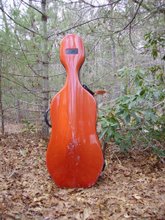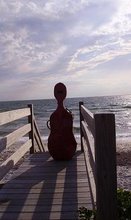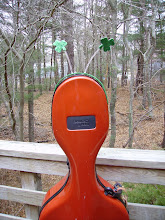I recorded Saturday's bluegrass festival, clipping the microphone to the leg of my jeans, to better hear my cello contribution. Even so, it was not always easy to hear the cello, sometimes for the best, but I am mostly pleased with how I sounded, even if few people heard me. Here's my blow-by-blow account, to aid in developing my strategy for acquiring a decent repertoire of fiddle tunes over the next several months.
Old Joe Clark, A
I played melody. On the whole, this was pretty good. Mostly in tune, mostly audible. I know there were a few times I slipped out of intonation, but they didn't stand out as much as I thought they would. In the future, maybe alternate a backup with the melody. Now I play melody all the way through, even when the violins switch to chopping, during the vocal parts. I just play softer in the vocal part, which probably isn't necessary. 5:56
Over the Waterfall, D
This is a tune I know and love to play on fiddle, so I tried to play melody by going up a string (into 4th position on the A string), but it was not working well, and trying to transpose mentally and play at the same time was not working for me. Thinking about it afterwards, it would have been better to go down a string, where the whole tune is in 1st position. We play it very fast. I felt this was very muddled and was disappointed because this is one of my favorite tunes. In the recording, I am not so bad, but I know this is one I want to work on. 1:53
Jessica's Waltz, D
Again, I played melody. This is a slow tune, and I had it memorized at one time, but realized I was playing it wrong, and it has been hard to re-memorize correctly. But, I played the parts I knew, and tried to stay with the group on this tune. Because it is slow, though, all the wrong notes stand out to me. Listening to the recording, it sounds like I am intentionally playing a counter-melody. That might be nice to try on purpose sometime, but for now, I will try to work out the tune correctly and re-memorize it. 4:54
Going to the Fair or Let's Go to the Fair, G
I don't know this tune, so concentrated on playing a bowed bouncy backup to go along with the bouncy tune. This would be a one to learn a choppy backup for. It sounds fine on the recording. Occasionally tiring for the bow arm, especially. I have not been able to find sheet music for this Ralph Stanley tune. 3:53.
Soldiers Joy/Liberty, D
I played melody on Soldiers Joy. Even though this is a tune I know (I play a quarter-note version while the fiddles are playing an eighth-note version), we started out fast, and it took me a few measures before I could jump in. Other than that, it was fine.
We went directly into Liberty, a tune I have learned on the fiddle, but could never play fast enough. I am working on a simplified version for cello. I play a few measures of my simplified melody, then whatever seemed to fit in. It doesn't sound too bad. Renata Bratt's book, The Fiddling Cellist, has an excellent section on accompanying Liberty. I need to work on that. I will probably go with her simplest alternative: root note, fifth, two notes to a measure, because we play this very fast.
3:53
Fish Song, G
This tune was written by Jim, our leader. It has a nice swaying Caribbean beat. It is a humorous love song from a man to a woman who is cooking fish for him. I really should learn this one. It is slow enough for me. I played a few bits of the melody, then whatever seemed to fit in. It sounds good, but I would definitely like to be playing more melody on this. 4:10
Eighth of January, D
This is one of the first tunes I learned on the fiddle. I still can't play it fast enough on the fiddle, and I have never even tried to play it on the cello. Jim asked his son to start this on out, and he took it at a speed I will never achieve on any instrument. Chopping chords is a much better alternative here. My G and D string accompaniment sounds good. 4:05
Backup and Push, C
This was our big bluegrass tune. Not everyone felt secure with it because the group has been playing it only a couple of months. Jim said, at worst, it would be our "joke tune." I mostly played open notes, pizz, because I do not know this tune and didn't want to be the one to make it into a joke. I was pretty much inaudible, which was just fine. I have downloaded the sheet music for this, but don't think I will attempt to play the melody. 3:27
Two Dollar Bill, A
This is a very simple tune, but I don't know it. I try to learn it by ear, each time we play it, but haven't really gotten it. I downloaded it from a fiddle tune website after the concert. I will play melody next time. This time I played some melody, some wrong notes, some backup. It doesn't sound terrible, but I look forward to learning this correctly! 5:24
Recording was helpful. It gives me an idea what to focus on. Next time, maybe I will clip the microphone directly to the cello.
So, my priorities are learning melody for Over the Waterfall, Jessica's Waltz, Two Dollar Bill, and the Fish Song; backup for Liberty and Eighth of January. The only tricky one here is the Fish Song, which I am going to have to learn by ear. Not my strong point, but a skill I need to work on.
Tunes I know reasonably well on the cello: Ashokan Farewell, Angelina Baker, Mairi's Wedding, Old Joe Clark, Soldier's Joy; sort of less well, from playing them on the fiddle: Red-haired boy, Redwing, Country Waltz, Girl I left Behind.
Other fiddle tunes I am working on now, in various stages, include: Coleraine, 100 Pipers, Star of the County Down, Amelia's Waltz, Road to Lisdoonvarna, Westphalia Waltz, Whiskey Before Breakfast, Crossing to Ireland, Wagon Wheel Notch, and Sister Jean. The first five I am also playing on the flute. I like Irish minor key tunes, and am trying to get in a few Celtic tunes before my Scottish cello/fiddle camp this summer, even if we don't play them in the fiddle group.
I'd like to have 25 tunes in the "reasonably well" category by the end of the summer, as well as an ever-improving approach to, and understanding of, accompaniment.
We'll see. I'm also doing a Suzuki recital, hopefully in mid-July. Not a whole book; just four pieces.
Subscribe to:
Post Comments (Atom)












2 comments:
Interesting reading. Too bad we can't hear it, too <g>. It's helpful to write it out though, isn't it? Sometimes I don't know what I think until I write it down.
I'm getting up the courage to put a sound file online. :-) Maybe with a smaller group so you could actually hear me; once I figure out how to put a recording online.
Meanwhile, yes, writing is a learning experience in itself. Verbalizing thoughts on music and musical goals is very useful. Writing them publicly adds a whole new dimension.
The recording is also a very helpful learning tool, and perhaps one day I will take the plunge and buy a video camera. I do enjoy your videos and those of others.
Post a Comment